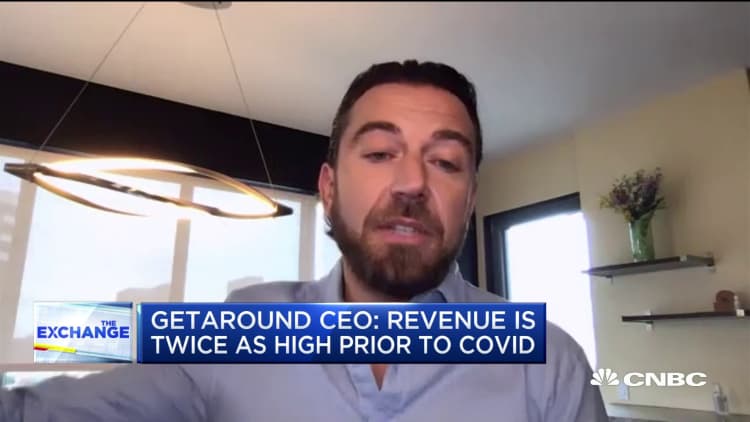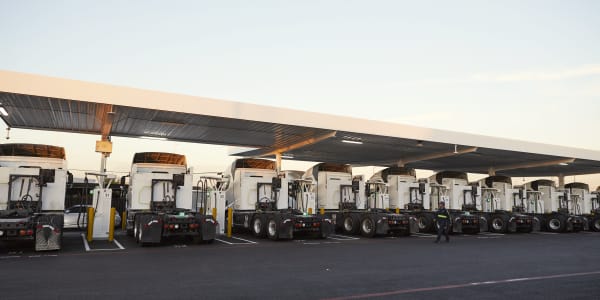In this weekly series, CNBC takes a look at companies that made the inaugural Disruptor 50 list, 10 years later.
After a decade during which ultra-low interest rates and abundant market liquidity grew Uber and Lyft into start-up giants and eventual IPOs, the rideshare model is under a great deal of stress.
Even with consumers bouncing back and ride numbers way up from pandemic lows, stocks of both companies are tanking after their latest earnings, and from wage inflation to unionization and gas prices, the current economy is not one that favors their business models.
In many respects, Uber and Lyft today are much more like big corporations than a reflection of any original definition of a local "rideshare" community, but one thing remains true: consumers do want alternatives to owning a car and traditional public transport options. Nearly 36% of U.S. adults say they have at one point used a ride-share app like Lyft and Uber, according to Pew Research.
If anything, the pressure on the top "rideshare" companies may leave room for additional models to make their case. Getaround is an example. Founded in 2009 and, along with Uber, an original CNBC Disruptor on the inaugural 2013 list, its mission has remained transitioning society away from every licensed driver in the world having a car: simply walk up to cars that are parked all over the street and tap an unlock button on your phone.
The IPO market may not be receptive right now, but its executive team and investors are betting that the concept will continue to grow.
"What's happening in transportation is a slow moving kind of shift from ownership to access, and that's building momentum over time," said Elliot Kroo, CTO and co-founder of Getaround. "More and more people are looking at alternative transportation options, realizing that car ownership is very expensive."
The pandemic and the related global supply chain issues, as well as robust consumer demand, have led to steep increases in prices of both new and used cars. Kroo said that while more people use car-sharing services like Uber and Lyft, more people are also thinking about getting rid of their cars.
Getaround wasn't immune from the pandemic. Kroo said from the lockdowns to the lifting of restrictions it went through a tough period with significant peaks and valleys in usage during the past two years.
"If you think about your options when Covid first hit, you're not you're not going to be as comfortable sitting in a car with other people, taking rideshare or in public transportation. The options if you didn't have a car were really limited. But if there was a car that you could walk up to, you didn't have to meet the person. That was one of the better transportation options available that was kind of Covid-friendly."
Even as Uber tanked on Wednesday, it reported 1.71 billion trips on the platform during the quarter, up 18% from the same quarter a year ago. And Kroo says Getaround is coming back faster and bigger than it was pre-Covid.

While Getaround isn't as widespread as Uber and Lyft right now, he believes the company has an opportunity as it expands into more countries and gets people joining the car-sharing movement. In 2019, it spent $300 million to acquire Drivy, a carsharing platform in Europe. Since the time of that deal its network has grown from 300 cities to over 850 cities across the U.S. and Europe.
In some respects, its business model is maybe closer to Airbnb than other gig economy companies.
"If you looked at the company ten, twelve years ago, I think people were mostly concerned about even the concept of letting some stranger use their own car. And that was how people thought about especially peer-to-peer car sharing back then."
In 2020, it hired a former Airbnb executive, Dan Kim, to lead its North American business and now chief operating officer, and it has launched programs that sound more like Airbnb than Uber or Lyft, such as its "Power Host" program for car "entrepreneurs" sharing fleets of two cars or more. Kim also had Tesla experience.
Getaround has also partnered with Uber, including a 2017 program which offered instant booking for potential drivers without cars, as well as "Uber Rent powered by Getaround" in April 2018, allowing people to rent and access Getaround cars through the Uber app.
Kroo says in-care technology will help in the ridesharing transition. "If a car already has the technology to connect to the internet, then there's potential to use that connectivity to make that car instantly shareable on a platform like Getaround."
Getaround is still a private company, and it has raised significant capital, approximately $600 million in funding. Its financing, like many start-ups over the past decade, grew quickly, from a series C round in 2017 of $45 million to a series D in 2018 of $300 million, led by Softbank, a deal Toyota also took part in.
During the pandemic, it raised $140 million (October 2020) with Reid Hoffman's and Mark Pincus' Reinvent Capital among new investors. At the time, the company said after a steep initial drop of 75% in usage due to Covid, it was growing again. It reported reaching 1 billion miles driven by its over 6 million users globally and a doubling in global revenue at the time of the funding.
Getaround has gone through some big changes, in management and model over the years. Early this year, founder and executive chairman Sam Zaid returned to the CEO role. This change came less than a year after the company's former chief operating officer, Karim Bousta, a former Lyft and Tesla executive, was named CEO (Bousta remains on the board).
The company also pledged in November of last year to have only electric vehicles on its platform by 2040. Kroo says that the company believes the future of the car-sharing industry will be all electric.
— By Alexis Gebhardt, special to CNBC.com
Sign up for our weekly, original newsletter that goes beyond the annual Disruptor 50 list, offering a closer look at companies like Getaround and founders like Kroo who continue to innovate across every sector of the economy.





